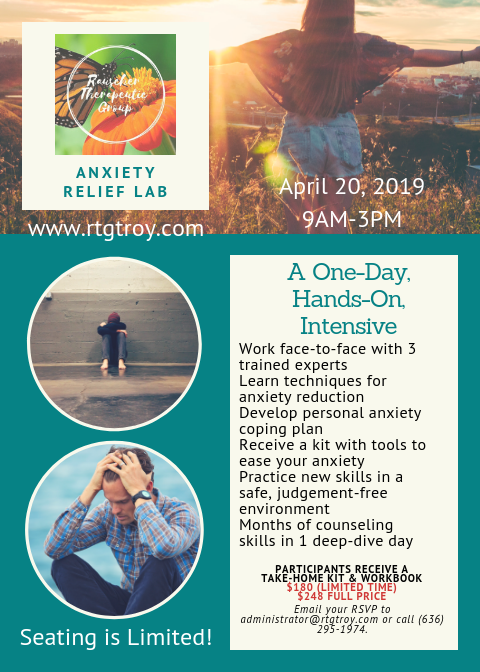
Meditation Room




At RTGTROY we have been offering informational and educational seminars publicly for the last few years. We have tried to offer seminars on a variety of subjects. Our aim was to eliminate some stress associated with worry about not having enough information.
Given our busy, on the go, society, we frequently had people who wanted to attend these seminars and couldn’t due to time restrictions. We decided this needed to change. We began the process of transitioning our seminars to online format.
We are now offering seminars, as they are available, through the website store. You can get the benefit of this sessions from the comfort of your home. Take seminars anytime you want. We truly hope you enjoy this service.

Anxiety can cause stiffness and tension in your muscles. Tightness in your neck, shoulders, back, and neck could all be signs of anxiety. Tense legs, clenched jaw muscles, and teeth grinding can also be attributed to anxiety.

The stress your body experiences from anxiety can also manifest in digestive issues, like a fluttering stomach, nausea, constipation, or diarrhea. These symptoms can have a strong negative impact on daily activity. If left untreated digestive issues can worsen and lead to medical illness.

The psychological strain associated with anxiety can lead to severe headache, as a result of chronic worry, racing thoughts, and fear. People also report an increase in temperature change through their body, increased heart rate, and dizziness.

Anxiety can make you feel edgy and lead to visible shaking, trembling, and irritability. You may feel restless, or fidgety. These signs may be noticeable to others.

The chronic worry and stress from anxiety can be exhausting. Many people with anxiety report a feeling of fatigue. Sometimes this combination can lead to an inability to fall asleep or trouble staying asleep. Overtime, insomnia can lead to a host of physical problems.

Heart rate and blood pressure can increase with anxiety causing multiple symptoms. You may become hot, sweaty, feel dizzy, or experience difficulty breathing. Some people have reported thinking they were having a heart attack. Anxiety symptoms can be severe and frightening.
Anxiety is real. The symptoms are real. The symptoms listed above are only some of the physical signs your body may be experiencing. If you struggle with anxiety, reach out for help. You do not have to go through this alone. RTGTROY can help.

Life today can seem overwhelming for many adolescents. Young people are confronted with physical and hormonal changes, school grade anxieties, being socially accepted and making life decisions about college or employment choices. Other factors, such as a parental divorce, a seriously ill relative or even moving to a new home can bring added levels of stress and anxiety. Being bullied, whether in person or online, will also contribute to the negative feelings a teen may be experiencing.
Teens affected by such factors are often suffering from depression and suicide may simply seem the easiest way to escape the blackness they are feeling. Depression is a mental health issue that doesn’t cure itself, but it does have a number of signs that can help a parent spot a teen in trouble.
Teens suffering from depression will often exhibit changes in eating and sleeping habits. They often are withdrawn, losing interest in friends and family, and no longer participating in favorite activities. Their school work may be suffering, they may have difficulty concentrating, and may not pay much attention to their personal hygiene and appearance.
In some cases the teen may verbalize feelings of wanting to die or simply outright threaten suicide. The warnings given may be more subtle, like saying “I won’t be a problem much longer.” Any such references to death or suicide are clear cries for help and shouldn’t be ignored.
Depression, whether in a teen or adult, is a mental health problem that can be treated. Any signs that a teen may be considering suicide should call for immediate action. Talk to your family physician or a professional counselor.
At RTGTROY we want to help families struggling with adolescent issues, such as depression. Please reach out. We are passionate about helping teens through crisis.
There’s also information and help from the National Suicide Prevention hotline at 1-800-273-8255. Acting early can help save a young life.
-Reprinted in full or in part with attribution to the American Counseling Association’s Counseling Corner Blog.
But for most of us these winter blues are just a minor inconvenience and, fortunately, one that you can do something about.
One contributing factor is the shorter days and lack of sunlight in winter. The obvious cure is to increase the amount of light in your life. If it’s a bright, sunny day, bundle up and get outside for a bit. If it’s gray and dreary, try turning on extra lights to brighten things up and use broad spectrum bulbs (often sold as “therapy lights”) that simulate natural sunlight.
Exercise also helps fight those tired and sluggish feelings. Just a short daily walk or gym workout can help your body and mind overcome feelings of low energy.
And even small changes can make a difference. When you’re feeling down, give a friend a call and talk about happy things. Watch a favorite funny TV show or movie. Read a book that you know you’ll enjoy, or spend some time on a hobby that makes you feel good.
Getting involved with others is another way to feel better. Start going out more, whether it’s socializing with friends or volunteering at your church, a local shelter, or nonprofit agency. Helping others almost always brings better feelings, and when you combine that good work with a nice bright smile, you may find you just don’t have time to feel blue.
Of course, there are many things that can cause sad feelings besides cold, gray skies. If you find that you just can’t overcome such feelings, and they’re interfering with your enjoyment of a normal life, seek help. A professional counselor can both help pinpoint the cause of your feelings and suggest ways to overcome the problem. At RTGTROY we have specially trained professionals who truly care about helping clients find answers to difficult questions and devoloping clear paths for growth.
Bottom line? Take action and don’t let the winter blues take the fun out of your life.
A good starting point is simply to make time for yourself. In today’s busy world, it’s easy to fill our days with work, family and social obligations, leaving little or no time for ourselves.
The fix for that is to include “you” in your daily schedule. Create a real schedule that includes time each day for at least one thing you find pleasant and enjoyable. Maybe it’s reading a book, working at a hobby, or just taking a relaxing walk. Put it on your calendar and make sure it happens.
Getting involved with others is another way to reduce stress and feel better about yourself. Community, civic and religious organizations are always eager for volunteers to help carry out their work.
Giving something back to the community can offer a meaningful escape from your own problems (and often puts such problems in a better perspective) while also providing a sense of fulfillment and self-worth that’s essential for good mental health.
And don’t ignore staying physically fit as a means to improve mental health. Studies find regular exercise is a great way to fight depression, for example. Plus, as we get ourselves into better shape, we usually start to feel more confident about ourselves — everything from how we look to what we can do. And that’s good mental health.
There’s no magic way to make stress and problems just disappear but building a little relaxation into your life, helping those in need, and staying physically active can all improve mental health and make it easier to cope with the problems you will face.
If you find that your actions don’t have you feeling better, check out the assistance that a professional counselor can offer. You do not have to go through this alone. RTGTROY has trained professionals who can help you strategize ways to defeat your stress.
There are many fixes for better mental health. Whether it’s steps you take on your own, or help you get from a professional counselor, good mental health is a goal worth achieving.
-Reprinted in full or in part with attribution to the American Counseling Association’s Counseling Corner Blog.
In today’s world, countless things can cause us to worry. Our health, job security, financial issues, school shootings, current politics… the list of potential worries seems endless.
While we can’t eliminate all our stresses, being worried about real things can and does perform a needed function in our lives — it can lead to action.
On the other hand, needless worry can actually be harmful. Needless worry adds unwanted stress to our lives and can even dramatically increase the health risks we face. The secret, of course, is identifying whether a thing causing worry is a real or a needless worry, and learning how to deal with each one.
When faced with anxiety and worry, our body reacts by pumping out a variety of chemicals, such as adrenaline, that cause various physiological reactions. These chemicals fueled our ancestors’ “fight or flee” reaction when that bear attacked. Although we seldom face angry bears today, yet our bodies still react the same way. Sustained, chronic worry can raise our risk of heart attack and stroke, increase blood pressure, lead to high cholesterol levels, and give us stomach aches, headaches and even back pain.
The starting point is identifying if the worry bothering us is real or needless. Often it helps to discuss the cause of your worry with someone else. If it is a real concern, one that you can do something about, then you want to channel that worry into action. Begin by making a plan for dealing with the cause of your worry, then carry it through. When you react this way you’re making a positive use of worry.
But if the cause of your worry is something beyond your control, you need to act to counter that worry rather than letting it build up inside you. Sometimes that simply means thinking about something over which you do have control or taking a simple action to take your mind off of that needless worry.
If watching the news, for example, makes you stressed and worried, stop watching. If the worry is still with you, refocus by doing something positive. Go for a walk, call a friend, or take a long bath. Your goal is to stop dwelling on those things you really can’t do anything about.
If chronic, especially needless worry is negatively affecting your daily life, consider seeking assistance from a professional counselor who can help you get worry under control. Contact RTG-Troy today for help. We offer many tools to assist you. You are not alone, you matter here!
-Reprinted in full or part with attribution to the American Counseling Association’s Counseling Corner Blog.
 The holidays are a fairly emotional time of the year for most of us. For some people, the holiday period brings memories of warm family gatherings and happy times. For others, it may bring feelings of depression related to loved ones who have passed on, or simply of childhood memories and experiences that weren’t very pleasant.
The holidays are a fairly emotional time of the year for most of us. For some people, the holiday period brings memories of warm family gatherings and happy times. For others, it may bring feelings of depression related to loved ones who have passed on, or simply of childhood memories and experiences that weren’t very pleasant.
While our memories and experiences of holidays past are not something we can change, we can try to ensure that the current holidays don’t add to any emotional burden we may already have. That may sound complicated, but actually all it means is having a little more awareness of the emotions we face at this time of the year, and of taking a little more control of our lives and actions so that we don’t end up feeling bad about this year’s holiday season.
An easy starting point? Pay more attention to your food and drink intake. Yes, Thanksgiving dinner and holiday parties offer many opportunities to over-indulge. But, remember, you are the one in control of your actions and choices. Limiting yourself to one helping of dessert, or refusing Uncle Waldo’s constant offers of more wine, doesn’t mean that you’re depriving yourself, but rather simply enjoying the holiday in moderation.
And, most importantly, you won’t feel guilty the day after, or face January with the problem of an expanded waistline. For most of us, the holiday period can be a stressful time. Your job is to try to be sensible and not add more anxiety and stress to what you may already be feeling.
That’s especially true when it comes to holiday parties. Yes, these are additional opportunities to be tempted by too much of too many wrong things to eat, but far too often a bigger problem is the opportunity to consume too much alcohol. All it takes is one office party and one drink too many and suddenly you’ve said or done something that you’ll not only regret the next day but that may negatively affect your career.
Yes, you want to enjoy this holiday season, but it’s important to remember that you, at all times, are the one in control of you. Keeping your actions sensible and reasonable doesn’t mean you can’t have a great time, but hopefully can mean you won’t have anything to regret.
For more tips on having a happy Holiday Season, contact RTG-Troy today. We are committed to assisting others reduce stress and anxiety. Sometimes having another person to bounce thoughts off of can ease your burden. We are here to help.
-Reprinted in full or in part with attribution to the American Counseling Association’s Counseling Corner Blog.
We are entering one of the busiest, and most stressful, travel periods of the year. According to the U.S. Department of Transportation, travel to a destination 50 miles or more away increases by over 50 percent for Thanksgiving and by almost 25% for Christmas and New Year’s.
While that adds up to even more cars on the road, and usually longer lines at airport TSA, it doesn’t necessarily have to mean more holiday travel stress for you.
You can actually lower your travel stress by simply accepting that there are some things you can’t control. Bad weather, airport delays, traffic jams or long waits at airport security are all outside your control, no matter how frustrated they may make you feel.
Instead, focus on the things you can control, including your own feelings. Start by planning as much as you can. If it’s a driving trip, check the weather reports and if a bad storm is looming, see if you could depart earlier or later to miss the worst of it.
Planning can also minimize airport delays. Experts advise booking an early flight, for example. Airports are often less crowded then and it leaves you extra time for a later flight if your flight is delayed, cancelled or over-booked. Also know the rules. Is your carry-on the right size? What time do you need to get to the airport? Can you bring wrapped presents?
A little attitude adjustment can even help with a seemingly endless TSA security line. Instead of feeling frustrated, do something silly like checking out your fellow passengers. Try guessing silently where they’re going, what their line of work is, or even why they’re dressed like that out in public.
The best way to handle stress and frustration is simply to refocus your mind away from the thing that is upsetting you. If it’s a traffic jam, getting mad doesn’t make other cars disappear, but playing something on the radio, telling the kids a story, or doing anything else that takes the focus off the immediate problem will make you feel better.
And most importantly, keep your kids happy, or at least occupied. Don’t forget their games, a couple of books, or snacks for when they’re suddenly starving. Happy kids mean less stressed out parents.
Holiday travel may not always be fun, but there’s no reason it has to be high stress. For more tips and tricks on handling stress contact RTG-Troy today. We are here to help.
-Reprinted in full or in part with attribution to the American Counseling Association’s Counseling Corner Blog.